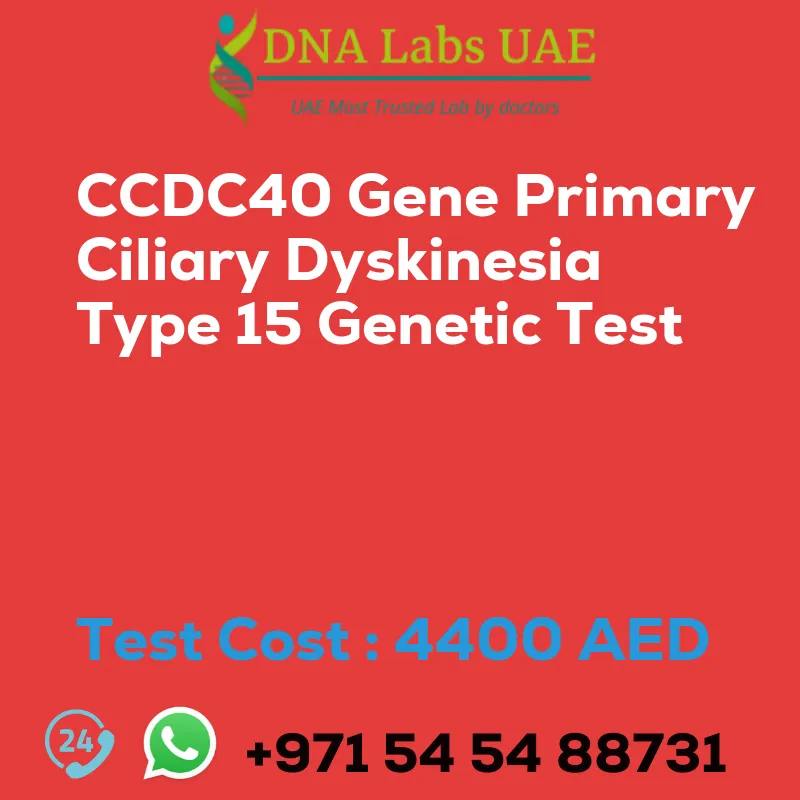CCDC40 Gene Primary ciliary dyskinesia type 15 Genetic Test
Components: Price – 4400.0 AED
Sample Condition: Blood or Extracted DNA or One drop Blood on FTA Card
Report Delivery: 3 to 4 Weeks
Method: NGS Technology
Test type: Ear Nose Throat Disorders
Doctor: ENT Doctor
Test Department: Genetics
Pre Test Information: Clinical History of Patient who is going for IARS2 Gene Cataracts, growth hormone deficiency, sensory neuropathy, sensorineural hearing loss, and skeletal dysplasia NGS Genetic DNA Test. A Genetic Counselling session to draw a pedigree chart of family members affected with IARS2 Gene Cataracts, growth hormone deficiency, sensory neuropathy, sensorineural hearing loss, and skeletal dysplasia NGS Genetic DNA Test gene IARS17
Test Details:
The CCDC40 gene is associated with primary ciliary dyskinesia type 15, which is a genetic disorder that affects the function of cilia. Cilia are hair-like structures found on the surface of cells and are involved in various important functions, including the movement of mucus and other substances in the respiratory tract.
Primary ciliary dyskinesia (PCD) is a rare genetic disorder characterized by impaired ciliary function, leading to recurrent respiratory infections, chronic sinusitis, bronchiectasis, and other respiratory symptoms. PCD can also affect the functioning of other organs, such as the ears, nose, and reproductive system.
NGS (Next-Generation Sequencing) genetic testing is a type of genetic test that can analyze multiple genes simultaneously to identify mutations or variations that may be associated with a specific disorder. In the case of primary ciliary dyskinesia type 15, NGS genetic testing can be used to identify mutations or variations in the CCDC40 gene that may be responsible for the disorder.
NGS genetic testing for primary ciliary dyskinesia type 15 can be helpful in confirming a diagnosis, identifying carriers of the gene mutation, and providing information for genetic counseling. It can also be used for prenatal testing in families with a known mutation in the CCDC40 gene.
It’s important to note that genetic testing should be done in consultation with a healthcare professional or genetic counselor who can provide guidance and interpretation of the results. They can also help determine the appropriate testing strategy based on an individual’s symptoms, family history, and other factors.
| Test Name | CCDC40 Gene Primary ciliary dyskinesia type 15 Genetic Test |
|---|---|
| Components | |
| Price | 4400.0 AED |
| Sample Condition | Blood or Extracted DNA or One drop Blood on FTA Card |
| Report Delivery | 3 to 4 Weeks |
| Method | NGS Technology |
| Test type | Ear Nose Throat Disorders |
| Doctor | ENT Doctor |
| Test Department: | Genetics |
| Pre Test Information | Clinical History of Patient who is going for IARS2 Gene Cataracts, growth hormone deficiency, sensory neuropathy, sensorineural hearing loss, and skeletal dysplasia NGS Genetic DNA Test. A Genetic Counselling session to draw a pedigree chart of family members affected with IARS2 Gene Cataracts, growth hormone deficiency, sensory neuropathy, sensorineural hearing loss, and skeletal dysplasia NGS Genetic DNA Test gene IARS17 |
| Test Details | The CCDC40 gene is associated with primary ciliary dyskinesia type 15, which is a genetic disorder that affects the function of cilia. Cilia are hair-like structures found on the surface of cells and are involved in various important functions, including the movement of mucus and other substances in the respiratory tract. Primary ciliary dyskinesia (PCD) is a rare genetic disorder characterized by impaired ciliary function, leading to recurrent respiratory infections, chronic sinusitis, bronchiectasis, and other respiratory symptoms. PCD can also affect the functioning of other organs, such as the ears, nose, and reproductive system. NGS (Next-Generation Sequencing) genetic testing is a type of genetic test that can analyze multiple genes simultaneously to identify mutations or variations that may be associated with a specific disorder. In the case of primary ciliary dyskinesia type 15, NGS genetic testing can be used to identify mutations or variations in the CCDC40 gene that may be responsible for the disorder. NGS genetic testing for primary ciliary dyskinesia type 15 can be helpful in confirming a diagnosis, identifying carriers of the gene mutation, and providing information for genetic counseling. It can also be used for prenatal testing in families with a known mutation in the CCDC40 gene. It’s important to note that genetic testing should be done in consultation with a healthcare professional or genetic counselor who can provide guidance and interpretation of the results. They can also help determine the appropriate testing strategy based on an individual’s symptoms, family history, and other factors. |







